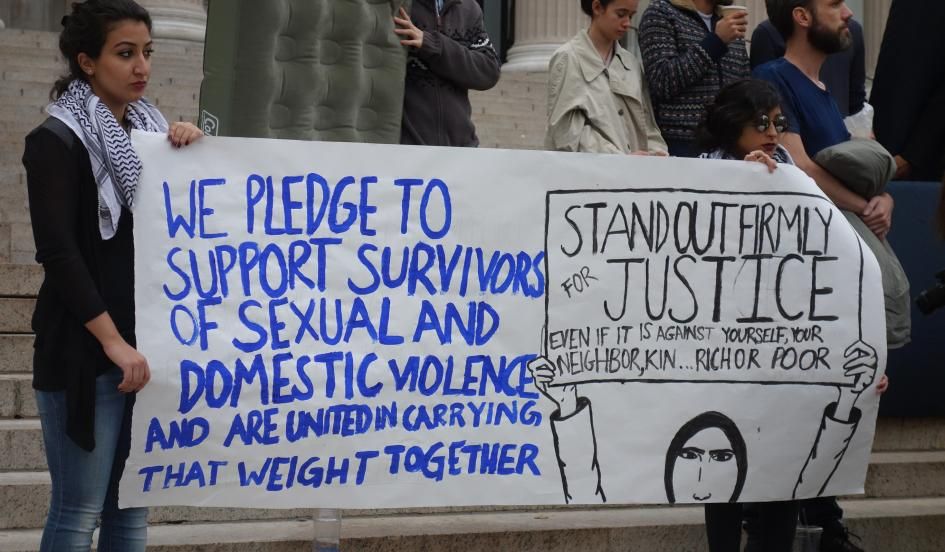
Nearly one-third of college men admit they might rape a woman if they could get away with it, a new study on campus sexual assault claims. Of those men, however, far fewer will admit this if the word rape is actually used during the course of questioning.
Approximately 32 percent of study participants said that they would have "intentions to force a woman to sexual intercourse" if ''nobody would ever know and there wouldn't be any consequences.'' Yet only 13.6 percent admit to having "any intentions to rape a woman" under these same circumstances. With the exception of one survey that was not counted because of inconclusive answers, all of the men who admitted to rape intentions also admitted to forced intercourse intentions. (Worth noting: Though the legal definition of rape varies from state to state, these researchers are using the widely agreed upon definition of the word as "intercourse by use of force or threat of force against a victim's wishes.")
The paper, "Denying Rape but Endorsing Forceful Intercourse: Exploring Differences Among Responders," was released recently in the journal Violence and Gender. The research comes amid heightened scrutiny of how institutions of higher learning handle sexual assault on campus. Though there is not an exact number, research such as the 2007 Campus Sexual Assault Study suggests that as many as 20 percent of undergraduate women suffer sexual assault.
According to the Centers for Disease Control and Prevention's most recent National Intimate Partner and Sexual Violence Survey, almost 20 percent of women in the United States have suffered rape. The survey also notes that some 43.9 percent of women "experienced other forms of sexual violence during their lifetimes, including being made to penetrate, sexual coercion, unwanted sexual contact, and noncontact unwanted sexual experiences."
Earlier research has also come to the conclusion that "when survey items describe behaviors...instead of simply label[ling] them...more men will admit to sexually coercive behaviors in the past and more women will self-report past victimization," the researchers write. But the new study, led by Sarah R. Edwards, an assistant professor of counseling psychology at the University of North Dakota, dives deeper into attitudes behind this discrepancy.
The researchers asked the study participants whether they endorsed forced sex and whether they endorsed rape, as well as a number of questions meant to gauge their levels of hostility and sexual callousness toward women. They found that those men willing to admit to intentions to rape harbored hostility—such as the belief that women are manipulative or deceitful—and had "angry and unfriendly" attitudes toward women.
Meanwhile, the men who admitted to an intention to rape only if it's described as an "intention to use force" tended to have callous sexual attitudes, described in the study as viewpoints that "objectify women and expect men to exhibit sexual dominance."
"Those people that do say that they might use force to have sex with someone, but they wouldn't call it rape, they seem to exhibit high levels of callous sexual attitudes and almost the opposite of hostility," says Edwards. In the study, the authors say this group appears to be hyper-masculine; in other words, they might think that acting sexually aggressively is the right way for a man to act.
Edwards cautions that this research is preliminary, because the sample group is very small: 86 men participated in the study, but only 73 were analyzed due to missing data. Because more than 90 percent of the participants were white and all described themselves as heterosexual, the study has demographic limitations. The team hopes to conduct this research on a larger scale, Edwards says. In the meantime, "the No. 1 point is there are people that will say they would force a woman to have sex but would deny they would rape a woman," Edwards tells Newsweek.
Psychologist David Lisak, a forensic consultant and law enforcement trainer renowned for his research on sexual violence, who notably determined that some 90 percent of campus rapes are committed by repeat offenders, says the study might help scholars ask more effective questions when they research campus rape.
Like the researchers, Lisak believes that the study emphasizes the need to address sexual callousness in rape prevention efforts.
"When you assess male college students, you will find some very, very troubling attitudes and beliefs," he tells Newsweek. "Regardless of whether or not these contribute directly to sexual coercion...challenging them and addressing them and educating students about them is absolutely critical."
Lisak says researchers must study whether campus rape prevention programs that address these attitudes correlate with a decrease in sex assaults.
"If it's possible to reduce some sexual violence by really comprehensively addressing these attitudes, that would be terrific," Lisak says. "And even if we can't, if the real core offenders are proven to be intractable, that kind of education and prevention work is absolutely crucial, and it is absolutely worth it on its own merit."
Uncommon Knowledge
Newsweek is committed to challenging conventional wisdom and finding connections in the search for common ground.
Newsweek is committed to challenging conventional wisdom and finding connections in the search for common ground.
About the writer
Before joining Newsweek, Victoria Bekiempis worked at DNAinfo.com New York and the Village Voice. She also completed internships at news ... Read more
To read how Newsweek uses AI as a newsroom tool, Click here.








